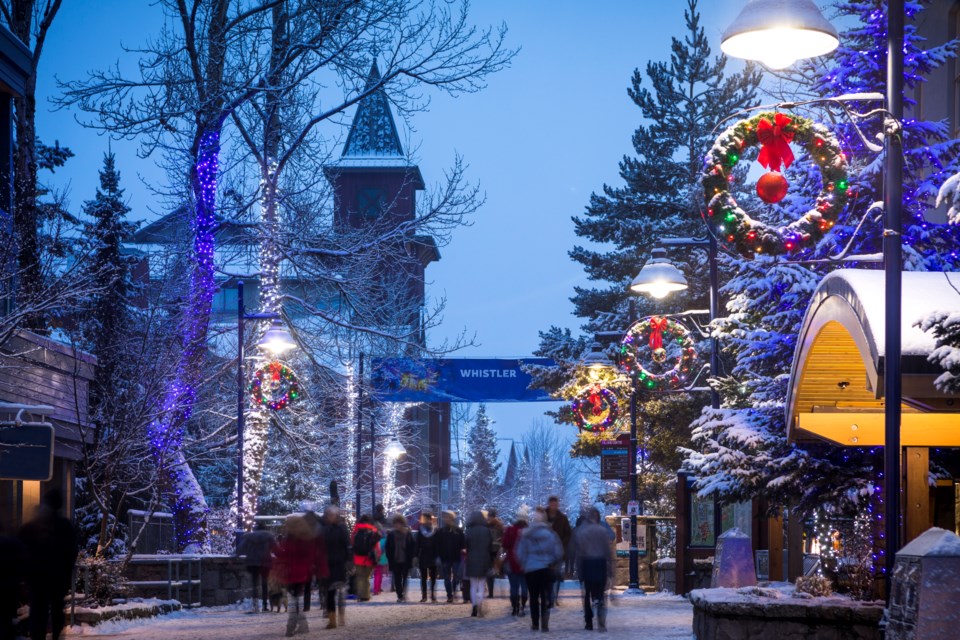Even if you don’t celebrate Christmas, most of us get into the feeling of Christmas this time of year—including the stressed out, crabby bits. And that can draw out all kinds of interesting phenomena, two of which share a pretty cool upside-down correlation.
First off, no matter what, you’ll run out of time. It’s like time insidiously turns itself inside out like a rubber glove pulled off a wet hand, wiping out any sense of utility. Thought you were totally under control for the holidays two weeks ago and now find yourself, along with all your good intentions, unravelling? Yep, that’s the festive-rubber-glove time warp.
My advice, if you haven’t already got your Christmas machinations under control, is just forget it. Take a break, head up the mountain or curl up under a quilt because you probably aren’t going to get it all done anyway.
A good Whistler pal told me years ago that she stopped trying to make a perfect Christmas because she realized she was driving everyone nuts—her family, her friends, guests, even the dog. She’d get so wound up and stressed out that she ended up alienating everyone and making Christmas hell.
Hubbie gently tried pointing this out again and again, and, after years of glazing over, she finally got it. She said it was the time she caught herself screaming at the dog to stop dropping its hairs all over the floor she’d just damp-mopped. After that, she let it all go—or at least the bits that didn’t really matter—and tried to have some fun herself. Good idea.
My gift to you this holiday season is some reassurance. If you thought you had a lot more time to prep for Christmas, and everything else, when you were younger, you’re not imagining it. You’re also not romanticizing les temps perdue. Or falling into the “ratio of life” trap, although that probably plays into it, too.
No, what you’re basically experiencing is what science confirms. And it’s got to do with our basal metabolic rate and other biological functions. Bottom line: as we age, the part of our brains that measures time like an internal clock actually speeds up so that our subjective sense of time changes accordingly. If you think it’s bad now, my mom, who’s edging towards 100, warns that it gets even worse as you really age. Weeks whiz by like days. Days feel like hours.
In the midst of all that whizzing, the second holiday phenomenon might help. And that has to do with ritual.
Ritual almost feels like a weird concept these days, relegated to the realms of steampunk and Goth. It’s definitely slipped out of habit in most of our modern, secular world, especially in this era of digital dominance. Christmas cards have morphed into texts, postal strike or not; Christmas newsletters get posted on Substack. So much for hand-writing cards in a room glowing in candlelight.
I like this reminder Dr. Andrew Weil shared a while back. It restores a breath of loveliness to the concept of ritual. After all, what are celebrations about this time of year, if not ritual and tradition?
Rituals are simply activities that invite us to step out of ordinary time. That in itself is an enchanting idea. They can play an important role in maintaining emotional good health—deepening relationships; allowing us to express important values; and offering a sense of security and continuity. Psychologists have explained that much of the material clutter people cling to is a futile attempt to cling to meaning and memories. You know, like dutifully hanging on to your great-aunt’s ugly turkey platter because it reminds you of her. Some call that memory hoarding.
Experts suggest finding other, non-material ways to honour those feelings and memories, like taking a moment to just sit and think about your great-aunt in a place or at a time that reminds you of her. That’s a ritual.
Rituals can be as mundane as walking the dog every morning, or taking time out to stare at a candle flame. You know what they are—they give us a sense of calm in the storm and that wonderful feeling of stepping out of daily routines and stress.
The thing is that just when we need them most, like during the holly-daze, rituals and traditions can get swept aside. It’s got something to do with that swelling sense of obligation compounded by a crushing sense of time slipping away, Ironically, those precious rituals we’re tempted to drop can deliver more pleasure and Christmas spirit than most of the other stuff we feel driven to do.
So maybe start a ritual that makes you happy. Walk in the snow on Christmas Eve with your kids, especially if that’s what you did with your family when you were little. Make modest gifts or treats—and stop making them when it feels more like obligation than pleasure.
Start your own low-key traditions. Tell stories between Christmas dinner—however big or small—and dessert: The naughtiest thing you did as a kid during the holidays; the best friend you ever had; your craziest Christmas memory. If you’re on your own, write them down or call up a pal. Set up candles, one for each person you’ve loved or who has loved you. Each night before Christmas, winter solstice, or whatever date suits you, light one and think of them. Or simply take a moment in the woods to pause and wonder.
These are the kinds of small rituals that stop time, transcend the everyday and remind us who we are. They can also shine a light on where we’re coming from and where we might be going.
Maybe try one. And enjoy the feeling of Christmas, however you spend it.
Glenda Bartosh is an award-winning journalist who invents new little traditions each Christmas since life is always changing.




